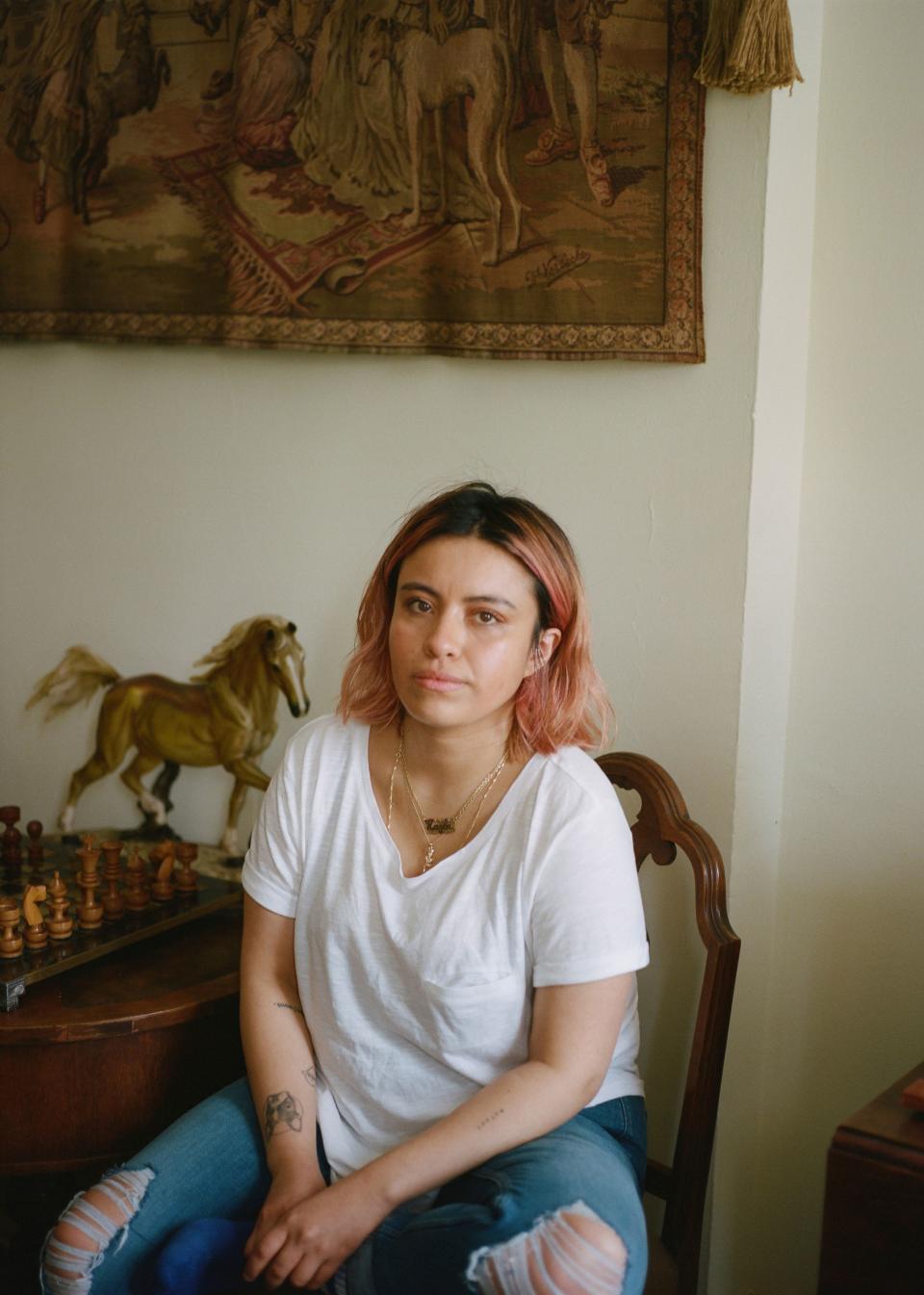For the Child of Immigrants, the American Dream Can Be a Nightmare
This is a story about love and sacrifice in the shining city on a hill. It is about the wildest, blindest love story in America, the story of the devotion immigrants have for a country that wants to expel them. This love perseveres past heartbreak; past giving your body, mind, and youth to a country you risked your life to get to, then seeing your own tax money pay for immigration officials to pursue an ambulance carrying a 10-year-old girl with cerebral palsy on the way to emergency surgery just to detain her and send her to a detention shelter without her caretakers. The curly-haired father who faces violent gangs in his home country: gone. The 5-year-old American citizen who believed his father (who is hiding in a church to give his lawyers more time to fight a deportation order) is just at work and he’ll come home soon: ICE makes no exception for them either. They used to have the decency of knocking down our doors in the middle of the night. It was scary and humiliating, but it was tonally appropriate—it was violence that felt violent. There was the illusion that the reason they were getting away with it was because it was dark; polite society was asleep. Now they are disappearing us in the middle of the day, in front of schools and hospitals and courthouses. Many of the children of these targeted migrants are American citizens. Do you believe, under the circumstances, that this love story could be true?
For the past year, I’ve been researching my forthcoming book, Undocumented America, in which I recount the intimate stories of undocumented immigrants throughout the United States. Regardless of their circumstances, they all have one thing in common—the looming threat of deportation. In early 2017, John Kelly (now President Trump’s chief of staff, but then head of the Department of Homeland Security) issued memos doing away with many Obama-era enforcement priorities, meaning targets for deportation not only included criminals and security risks but overnight became anyone and everyone. Minors and the parents and spouses of American citizens were suddenly in the crosshairs—and it is no exaggeration to say that in this current moment, immigrants are being hunted like animals. Yet when we talk about who deserves protection from this policy, we only talk about Dreamers—undocumented immigrants who arrived in the States as children and who had been given safe harbor here under DACA (Deferred Action for Childhood Arrivals). What about those children’s parents, the protagonists of that original love story?
I am one of those children. And I know that love story like the back of my hand.

I was 5 years old when I arrived in New York City from Ecuador. During that first summer in America, my undocumented parents took me to Times Square, the Empire State Building, the Twin Towers, Central Park, Bloomingdale’s window displays, the Bronx Zoo, Coney Island. “This is America,” they said, spreading their arms wide. I learned about America at home, too. Although my family was poor when I was a kid, my mother’s closet has always been filled with vintage dresses from secondhand stores. She loves dresses that cinch at the waist and flare out extravagantly, and she collects pillbox hats, mink shawls, white dinner gloves, tiny clutches, and gilded brooches. Before she learned the word vintage, she called these dresses “from a time before.” In context: “Daughter, I need a floral dress from a time before to wear to church.” The vagueness annoyed me. I told her that could mean anything from the early Neanderthal period to the Middle Ages. But she would just hum Frank Sinatra as she twirled in her dresses, because we both knew what she meant. She meant the same thing old white racists who want America to “return” to greatness now mean—an imagined snapshot of an anonymous suburb in the 1950s. A Norman Rockwell painting where a girl in a poodle skirt shares a milkshake with a blond boy with a cowlick. A time before.
Once, for a wedding, my mother sewed me into a baby blue chiffon prom dress from the 1960s, hemmed to conceal a stain. I couldn’t breathe in the dress, but I looked like a vision of who she wanted me to be. White. My mother may not have wanted me to be white, but she feared what would happen to me when the world realized I wasn’t. She had big dreams for me. A stay-at-home mom until recently, she told me, when I was little, that I needed to be a career woman; that way, I’d never have to extend my hand to a man to ask for money. America for her means fully empowered womanhood. When she sees glamorous, successful women on TV, women like Hillary Clinton or Condoleezza Rice, she whispers, “I wonder what it feels like to be a successful woman.” Then she pauses for a moment before she turns to me, her voice turning sharp, as she says: “That’s why we stayed, you know. So you could be a successful woman. I live through you.”
While my mom stayed at home, my dad was on the front lines of America as an immigrant, working in the restaurant industry. He faced racist abuse, wage theft, devastating humiliation, xenophobia, grueling manual labor, poor pay. My father has always had the rhetorical style of a Latin American dictator, which is to say wordy, and has also been excessively prone to metaphor. America to him has always meant two different sports—baseball, and soccer. He watched Babe Ruth documentaries all the time and sought out biographies about the baseball star from the library. He admired Ruth for his bootstrap story. Over time, he became obsessed with the New York Yankees and taught himself to understand the rules of baseball. He started taking me to games, buying tickets for seats in the nosebleed section, and once he brought me home a laminated photo of the captain at the time, the legendary No. 2, Derek Jeter, that he purchased from a man on the street. When my little brother was born in November 1998, the Yankees were playing in the World Series. My brother is named Derek.
For my father, baseball seemed like the purest form of assimilation. But he was obsessive about teaching me about another sport, too. He told me that, in America, our family was a soccer team. We all had roles. His position was defense. I was the star kicker. He would protect me and, in turn, I would be my family’s face in the world, bearing both of my parents’ last names. Cornejo, his. Villavicencio, hers. My mother and father worked hard behind the scenes so I could shine on the field, so I could be a Latin American team making goal after goal against their colonial rulers—Portugal, Spain, or England. In Ecuador, my father had been such a talented soccer player that his nickname was Ronaldinho, after the Brazilian soccer star. In America, he passed on the crown to me. Whenever I had a standardized exam or a job interview or was working on an album review for the local jazz newspaper, he would say, “Your team is behind you. Make the goal.” I’ve made goal after goal for 25 years and it’s made my parents proud. But do you want to know something? Pride don’t mean shit.
I never identified as a Dreamer. First, I thought the acronym was cheesy. Second, I feel sick at the thought of the American public pitying me for my innocence, my hands clean from my parents’ purported sin in bringing me here. It’s a self-righteous position I want to kick in the balls—pitying the child while accusing the parents of doing something that any other good parent would have done under the same circumstances. And if American citizens’ love of law and order is so pure that they would have let their children rot or starve or be shot or be condemned to a future of no future instead of coming here, then they’re not fit to shine my parents’ shoes.
My parents are quick to identify as American. They go to the Fourth of July fireworks by the Brooklyn Bridge every year and root for the U.S. in the Olympics. In public, my mother says her favorite book is the Bible, but it is actually Hillary Clinton’s Living History. She has entire passages memorized. (My mother idolized Hillary from the moment she laid eyes on her, which was shortly after a young Bill Clinton shook hands with my mother at a campaign stop in Brooklyn. When Hillary wore headbands, my mother wore headbands. When she forgave Bill, my mother did, too.) My parents train for 5Ks together. On weekends, they go to the Union Square farmers’ market or to Chinatown for dumplings, like any other New Yorkers. My relationship with America is a little more complicated than theirs. I have not inherited the cognitive dissonance necessary to unconditionally love something that hates you, and I am childless—I have dogs, not kids—so I don’t take consolation in the hope that my children will reap what I sow, that I will plant seeds that will bear fruit my children will eat. This all ends with me.
The twisted inversion that many children of immigrants know is that, at some point, your parents become your children, and your own personal American dream is making sure they age and die with dignity in a country that has never wanted them. I have excelled in this country; I am so very much the American Dream that I should be bottled and sold—but the parents who brought me forth, who are responsible for everything from my lovely Catholic school cursive to my commitment to philanthropy, are being persecuted like the rest of the 11 million undocumented immigrants who have laid down roots in the country they love and who now face a painful expulsion. When I watched my parents watching the Winter Olympics this year, the pair of them in front of the television, their hands over their hearts and their eyes sparkling with pride for the athletes on-screen, my eyes were only on them and my heart was in my throat. My allegiance, as ever, is to them; they are the country that I love. What makes me American—what makes the children of immigrants American in the most fundamental of ways—is something we learned from watching how unkindly America has treated our mothers and fathers. Our entire lives have been spent trying to deserve America. America needs to earn us, too.
Karla Cornejo Villavicencio is a writer and Ph.D. candidate in American Studies at Yale University. She is an Emerson Fellow.


